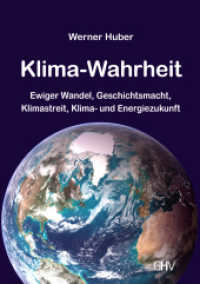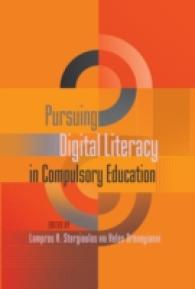Full Description
Seeing the role of transitional justice as an area of contestation, this book focuses on the principle of equality guaranteed in the access to transitional justice mechanisms. By raising women's experiences in dealing with the law and policies as well as the implications of community and family practices during post-conflict situations, the book shows how these mechanisms may have been implemented mechanically, without considering the different intersections of discrimination, the public and private divides that exist in the local context or the stereotypes and values of international and national actors.
The book argues that without unpacking the barriers in the administration of transitional justice, the different mechanisms that are implemented in a post-conflict situation may set a higher threshold for the participation of women. Moreover, by taking into account women's perceptions of justice, it further argues that scholars have paid insufficient attention to the welfare structures that are produced after a conflict, particularly the pensions of veterans. Going beyond the focus on sexual violence, a relationship between the violations and post-conflict economic justice may have longer-term consequences for women since it perpetuates their inequality and lack of recognition in times of peace. The use of transitional justice may thus exacerbate the invisibility of and discrimination against certain sections of the population.
Inspired by the work of Hannah Arendt and based on extensive field research in Timor-Leste, the book has larger implications for the overarching debate on the social consequences of transitional justice.
Contents
1. Introduction: 'The Blind Letters'
I. Transitional Justice: A Brief Overview
II. Women's Rights within Transitional Justice
III. A Feminist Research
IV. Ethics of the Research Undertaken
V. Structure
2. Transitional Justice in Timor-Leste: 'Loron Loron, Kalan Kalan'
I. The Background: History of Timor-Leste
II. International Legal Framework
III. Human Rights Violations
IV. On Justice Received
V. Access to Transitional Justice
VI. Women's Participation in Transitional Justice
VII. Barriers Faced by Women When They Access Transitional Justice
VIII. Conclusions
3. Silence and Memory: 'They are Waiting for Us to Die'
I. Women's Silence and Lack of Recognition after a Conflict
II. On Women's Silence in Timor-Leste
III. On Memory: Hyper-Masculinisation of Society and National Identity
IV. The Continuum of Violations against Women
V. What Women Want
VI. Conclusions
4. Women and Prosecution: 'We Captured the Dogs But Not the Owners of the Dogs'
I. Prosecutions in Timor-Leste
II. The Legislation
III. Accounts of Crimes Committed against Women
IV. The Public: The Investigations
V. The Public: The Proceedings
VI. The Private Interference
VII. Sentences, Women and the Follow-Up
VIII. Conclusions
5. Women, Truth and Reconciliation: 'Here Comes the Victim'
I. The CAVR
II. Focus of the CAVR on Women
III. The CTF and its Focus on Women
IV. Women's Participation
V. Different Reconciliation Discourses
VI. Women's Healing and the Understanding of Truth
VII. Women's Recognition and Political Follow-Up
VIII. Conclusions
6. Women's Access to Reparations: 'Men Were the Most Affected'
I. The Complexity of Reparations
II. Reparations Provided by the UN, Including the Special Panels
III. Reparations Provided by the Truth Commissions
IV. Reparations Established in the Chega! Report
V. Reparations Provided by the Timorese State
VI. The Way Forward
VII. Conclusions
7. Women's Access to Post-conflict Benefits: 'Because I Did Not Hold a Gun'
I. DDR, Veterans' Pensions and the Exclusion of Women
II. The Veterans' Pensions in Timor-Leste
III. The Veterans' Pension Law and Discrimination against Women
IV. The Implementation: Local Committees of Veterans and the Private Dynamics
V. Getting More Private: The Pensions within the Family
VI. (Un)Expected Effects of the Timorese Veterans' Pensions
VII. The Limits of the Discourse on Rights
VIII. Conclusions
8. Conclusions: 'So it Does Not Happen Again'








